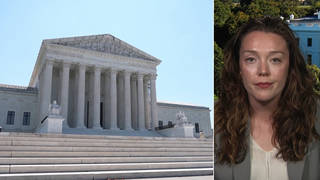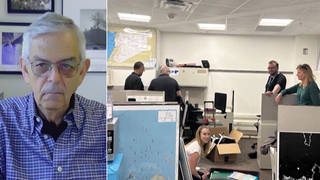
Guests
- Adam Goldmanreporter for the Associated Press. He and his colleagues were awarded the Pulitzer Prize for Investigative Reporting for a series of articles revealing the extensive domestic surveillance program deployed by the New York City Police Department in the wake of 9/11.
After years of spying on Muslim neighborhoods, infiltrating groups and eavesdropping on conversations across the northeastern United States, the New York City Police Department has admitted its secret Demographics Unit failed to yield a single terrorism investigation or even a single lead. In the years following the Sept. 11 attacks, the NYPD secretly infiltrated Muslim student groups, sent informants into mosques, eavesdropped on conversations and created databases showing where Muslims lived, worked and prayed. We’re joined by Adam Goldman, who co-wrote the Pulitzer Prize-winning Associated Press series that revealed the spy program and, most recently, its failure. [includes rush transcript]
Transcript
JUAN GONZÁLEZ: The New York City Police Department has admitted its secret Demographics Unit that spied on Muslims in an elaborate CIA-backed effort over a more than six-year period failed to yield a single terrorism investigation or even a single lead. In the years following the September 11th attacks, the New York police secretly infiltrated Muslim student groups, sent informants into mosques, eavesdropped on conversations and created databases showing where Muslims lived, worked and prayed.
Court records unsealed Monday show information collected by the NYPD’s Demographics Unit did not spark a single investigation. Assistant Police Chief Thomas Galati said, quote, “I never made a lead from rhetoric that came from a Demographics report, and I’m here since 2006. I don’t recall other ones prior to my arrival.” In his unsealed testimony, Galati confirmed the police gathered information on people even when there was no evidence of wrongdoing, simply because of their ethnicity and native language. Galati said a business can be labeled a, quote, “location of concern” whenever police can expect to find groups of Middle Easterners there.
This latest story was first reported by the Associated Press, which first uncovered the NYPD’s Demographics Unit. This is an excerpt from a video that accompanied the AP’s first story on the NYPD’s spying.
AP REPORT: At this New Brunswick, New Jersey, apartment, an alarming scene was found inside unit 1076: terrorist literature strewn about and a wealth of computer and surveillance equipment. But this wasn’t the command center of a terrorist cell. The materials belonged to a secret team of NYPD intelligence officers, a unit operating miles outside its jurisdiction.
AMY GOODMAN: Over the past year, the Associated Press has continued to reveal more details of the NYPD’s actions. These include the targeted surveillance of Shiite mosques following increased tensions between the U.S. and Iran, the practice of spying not just in New York but across the Northeast, financial backing from the White House for the program, and the targeting of Muslim mosques with tactics normally reserved for criminal organizations.
The police departments have drawn widespread protests and even criticism from the FBI, which has said these operations damaged its partnerships with Muslims and jeopardized national security. Faced with protest and calls to resign, New York Police Department Commissioner Ray Kelly defended the spying in February.
COMMISSIONER RAY KELLY: We believe we’re doing what we have to do, pursuant to the law, to protect this city, a city that’s been attacked successfully twice and had 14 plots against it in—you know, in the last two decades.
AMY GOODMAN: We’re joined by Adam Goldman, who co-authored the Associated Press series that revealed the New York Police Department’s spying and, most recently, how it led to no leads. He was part of the Associated Press team that won the Pulitzer Prize for Investigative Reporting for the series.
Adam, welcome to Democracy Now! Talk about your latest piece and also the scope of the spying.
ADAM GOLDMAN: Well, our latest piece, we feel, is important because it—it really brings to the forefront this idea that what the NYPD was doing, in particular with the Demographics Unit, was fruitless. The NYPD has said repeatedly, you know, what they’re doing is keeping the city safe, but as this deposition shows, by the top NYPD officer in the intelligence unit, nothing much came from these efforts that—the Demographics Unit and what they’ve been doing since 2003. And critics of the Demographics Unit would say that the deposition only shows more of what the NYPD is doing, which is ethnic and religious profiling.
JUAN GONZÁLEZ: Well, Adam, how was the deposition obtained in the first place? Can you give us some of the background on that?
ADAM GOLDMAN: Well, we obtained the deposition after it was unsealed. Galati had to do a deposition as part of a class action lawsuit that dates back to the '70s, when the NYPD was spying on political groups. And as a result of that, the lead plaintiff in the case, Barbara Handschu, in which the case is known, there were a series of—a series of agreements and settlements made with the NYPD in which the NYPD said that they wouldn't gather this type of information on people without probable cause. And after 9/11, the standard got changed to reasonable suspicion.
JUAN GONZÁLEZ: And so, then the lawsuit was an attempt to determine whether the NYPD was in violation of the Handschu decision?
ADAM GOLDMAN: Yeah, that’s right. After we started publishing our stories, we also published secret NYPD documents that were provided to us. And we believe the lawyers used those to help get this deposition.
AMY GOODMAN: Let’s turn to some of the testimony of NYPD Assistant Chief Thomas Galati. In your article, Adam, you note he overheard two Pakistani men complaining about airport security policies that they believed unfairly singled out Muslims. Galati said police were allowed to collect that information because the men spoke Urdu. These are his exact words, quote: “I’m seeing Urdu. I’m seeing them identify the individuals involved in that are Pakistani. I’m using that information for me to determine that this would be a kind of place that a terrorist would be comfortable in,” unquote. Your response?
ADAM GOLDMAN: Well, the people involved in the Handschu case would argue that, you know, that’s clearly—that’s First Amendment-protected speech. The police are free to go anywhere they want as a private citizen. You know, obviously they can go to restaurants. You know, they can go to mosques. They can do things that you and me can do. But, you know, when they start going to these places and recording constitutionally protected speech, writing it down and putting it in police files, and, you know, as a result of that, putting the name of innocent Americans in these police files, you know, the lawyers would argue that that’s where they’re crossing the line, and that’s where they’re violating Handschu. And they’re actually retaining that information, which is a violation of Handschu.
AMY GOODMAN: NYPD Assistant Chief Thomas Galati also justified eavesdropping on a conversation in a Lebanese cafe. He said analysts might be able to determine that the customers were from South Lebanon. Galati went on to explain, quote, “That may be an indicator of possibility that that is a sympathizer to Hezbollah because Southern Lebanon is dominated by Hezbollah.” Adam?
ADAM GOLDMAN: Well, once again, critics of this program would say that’s just nothing more than crude profiling. It’s guilt by suspicion. So, everybody from South Lebanon is possibly connected to Hezbollah? I mean, that’s sort of like saying, you know, if you’re Jewish and—you know, if you’re Israeli and you live on the West Bank, are you a radical settler?
JUAN GONZÁLEZ: Well, also, there had been previous press reports that at least one terrorist plot had been—the uncovering it had been aided by information the Demographics Unit found. But your reporting suggests that that’s not—or indicates that that’s not true. Could you explain that?
ADAM GOLDMAN: Well, it’s Galati himself who says it’s not true. The public department has been on the defensive trying to defend these efforts and the $3 billion they’ve spent on this. And Galati testified that the Demographics Unit never generated a lead or a terrorism case. And as part of that, we assume he’s talking about the 2004 case in which there was a young man who was in a bookstore, and a confidential informant from the NYPD developed a relationship with him, and eventually, you know, it was revealed through an NYPD operation—you know, a sting, essentially—that, you know, he wanted to bomb the Herald Square subway tunnel. But Galati says—under oath, I might add—he testified that that case, that bookstore, wasn’t a result of the—wasn’t a result of the Demographics Unit. Now, the deputy commissioner, Paul Browne, and this guy Mitch Silber, who used to run the—used to be the top analyst, NYPD, had publicly said that, “Well, that’s not true,” that “We did learn learn about this bookstore from the Demographics Unit.” So, you know, there’s a disconnect there. I’ll give Galati the benefit of doubt, because he’s testifying under oath.
AMY GOODMAN: Last month, an audiotape was released of the 911 emergency call that helped uncover the New York Police Department’s secret spying on Muslim neighborhoods inside New Jersey. On the tape from June 2009, a building superintendent in New Jersey told a 911 dispatcher he had discovered a suspicious apartment as part of a routine check.
BUILDING SUPERINTENDENT: Came across an apartment where there’s some suspicious activity.
911 DISPATCHER: What’s suspicious?
BUILDING SUPERINTENDENT: Suspicious in the sense that the apartment has about—has no furniture except two beds, has no clothing, has New York City Police Department radios.
911 DISPATCHER: Really?
BUILDING SUPERINTENDENT: There’s computers in there.
911 DISPATCHER: There’s what?
BUILDING SUPERINTENDENT: There’s computer hardware, software, you know, just laying around. There’s pictures of terrorists. There’s pictures of our neighboring buildings that they have.
911 DISPATCHER: In New Brunswick?
BUILDING SUPERINTENDENT: Yes.
AMY GOODMAN: On the tape from June 2009, the building superintendent in New Jersey told the 911 dispatcher he discovered a suspicious apartment as part of this routine check. Adam, talk more about this.
ADAM GOLDMAN: Well, this was an apartment in New Brunswick, New Jersey, that the NYPD Intelligence Division had been using as a base of operations, essentially, to spy on citizens of New Jersey. And we learned about that safe house, and we wrote about it originally in our first story in the Pulitzer series that we published in August of 2011. When we tried to get the 911 call—eventually we had to sue the New Brunswick Police Department after NYPD meddled with the case, and we obtained that. And they were using that apartment to, we believe, spy on a Muslim student association in New Jersey.
And, you know, what makes that interesting, on several levels, but most importantly, the federal authorities and others say that the NYPD went to New Jersey, and they didn’t tell anybody. And then, when this call came in, you know, the FBI Joint Terrorism Task Force and local police responded to the house. I mean, it sets up a dangerous situation when other law enforcement officers are working in a state, and they don’t tell anybody.
JUAN GONZÁLEZ: Adam, you mentioned the FBI. Could you retrace for our viewers and listeners this whole issue of the FBI stance on this spying by the Demographics Unit? It’s not the first time that the FBI has raised publicly skeptical questions about activities, of anti-terrorism activities of the New York Police Department. But the department, on the other hand, has engaged in a pretty aggressive public relations campaign to defend its activities.
ADAM GOLDMAN: Yeah, the NYPD has really been out there defending—defending what they’ve done, saying they—you know, everything they’ve done has been—conforms to Handschu. The FBI’s problem with what the NYPD is doing is that when the NYPD Intelligence Division comes to the FBI with a possible lead or referral, the FBI has to be sure that information was gathered in a way that can be used in court and that it wasn’t, you know, generated from First Amendment speech, protected speech. So, there are things that the FBI has refused to take from the NYPD. There is a great deal of mistrust there between these two organizations. The FBI doesn’t feel that it can trust the NYPD Intelligence Division in how they’re gathering this information, and if, in fact, it was a legitimate lead or, in fact, were they just doing what the Demographics Unit was doing—they’re just going into, you know, a bookstore and spying on people and then putting an undercover officer or an informant there and saying, “Oh, yeah, this is how we obtained the information.” But in reality, how they obtained it was, you know, spying on people who were just having political speech. And it reached a head when we published a story about the NYPD and the Demographics Unit mapping the Muslim community in Newark. The NYPD said, “Well, we were following a lead,” but we know that’s not true. We know from our sources in the NYPD that they did the same thing they did in New York. They just went to this community, and they mapped it, without any probable cause. The cause was that they were Muslim, so thus we need to go over there and we need to take a look at them. And then we—
AMY GOODMAN: Adam, we’re going to have—
ADAM GOLDMAN: OK.
AMY GOODMAN: We’re going to have to leave it there, because we have to go to a breaking story in the Arctic. Adam Goldman, a reporter for the Associated Press. He and his colleagues won the Pulitzer Prize for Investigative Reporting for the series they did revealing the extensive domestic surveillance program deployed by the New York Police Department in the wake of 9/11.












Media Options